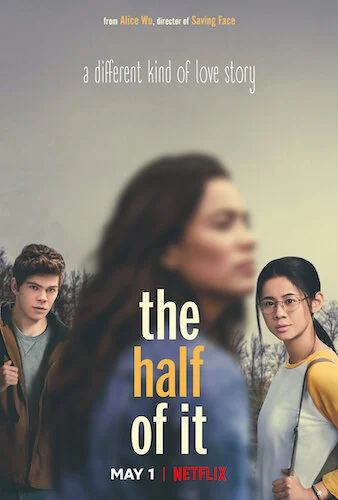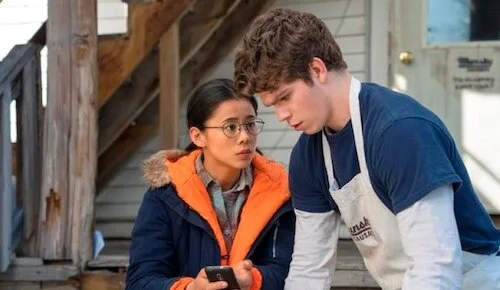The Half of It
Alice Wu’s first offering in fifteen years is a humble little Netflix romantic dramedy that soaks in all of the conventionalities of the genre, much to lead character Ellie’s chagrin (her father, a cinephile, has brought her up with a strong artistic palette). That’s part of the appeal, though. Sometimes, life can be corny, even if you feel it is topsy turvy. A teen perspective on the discovery of sexuality, The Half of It is a tale of queerness told in a very open way, plausibly to encourage the discussion that people may have watching this film. Wu herself discovered she was gay while in university, and had to experience coming out. She stages her character Ellie against all odds: in a highly religious town, without any friends, as she and her father are struggling to make ends meet. Even if she felt it was a good time for her to come out, would those around her accept her? Classmates already mock her. So, she keeps her orientation away from us as well, and her refusal to ignore it anymore is our gradual revelation.
She is caught in a love triangle, as she is paid to write love letters by Paul — a simple minded, yet earnest, jock — for the girl that they both love named Aster. Aster herself is the daughter of a pastor, and she isn’t sure if she herself is religious. Paul has family issues back home. Each of these classmates has a side of them they have to hide from the world, as they worry about ridicule. Let’s face it. In high school, we all were worried that we would be made fun of for even the smaller things, let alone a major part of our self identity. Wu makes sure that we get enough of a taste of this, without rubbing our noses in it every possible chance; we don’t know the stories of every classmate, but we know they have tales to tell for another day. Wu uses The Half of It to describe herself as much as possible, including the love of cinema. Ellie’s father is caught watching Casablanca, Wings of Desire, and The Philadelphia Story (all are masterful picks). Wu’s own film strays a tiny bit away from common resolution, and yet it follows the same path either way. I don’t think this is laziness. I believe this is dramatic irony in the face of Ellie, who is permanently being made to feel that she is not normal, based on how her surroundings respond to her (including the very film she is in).
Ellie trying to help Paul.
While this renders The Half of It fairly by-the-numbers, it also opens up a more gentle discussion on teenage self awareness in 2020. With a few interesting ideas tossed in (the stunningly animated opening, Ellie’s texting marathon, and the ping pong dialogue sequences come to mind), Alice Wu attempts a number of creative devices to get The Half of It to land. If she can’t stray too far away from having a widely accessible film for youths to relate to, she can definitely try and channel the quirkiness of Gen Zers, which she pulls off. Despite being called The Half of It, we get the entire story at face value, which is appropriate in this case. It’s a fun, homely film to have on for an hour and a half. You can’t really go wrong with it.
Andreas Babiolakis has a Masters degree in Film and Photography Preservation and Collections Management from Ryerson University, as well as a Bachelors degree in Cinema Studies from York University. His favourite times of year are the Criterion Collection flash sales and the annual Toronto International Film Festival.






